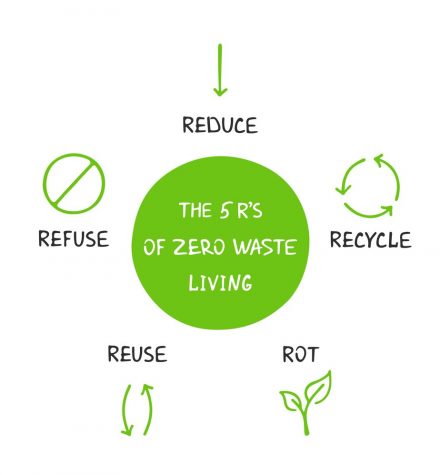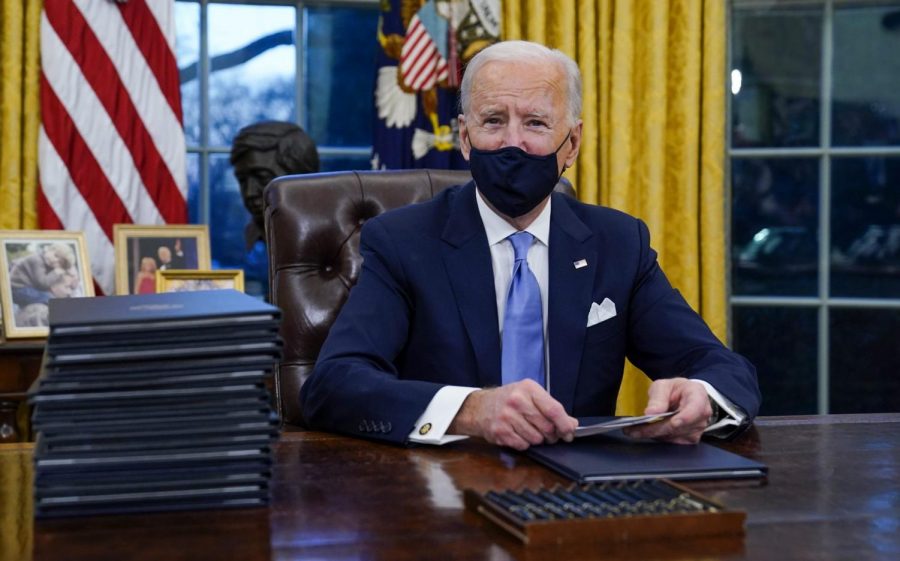Students Evaluate President Biden’s New Environmental Policies
Once inaugurated, President Biden quickly got to work, writing policies in response to climate change, COVID-19, immigration, racial injustice and more.
March 23, 2021
Inaugurated on Jan. 20, President Joe Biden immediately focused on writing policies to tackle the United States’ most daunting issues, including climate change and the deterioration of the environment.
Two of the largest steps that President Biden took toward environmental restoration are rejoining the Paris Climate Accord and pledging to cancel the Keystone XL Pipeline. The Paris Climate Accord, a global treaty that pledges to limit climate change, was previously exited in 2020 by the US under the Trump Administration. The Keystone XL oil pipeline is a proposed extension to the existing Keystone Pipeline that extends from Alberta, Canada to various locations in the United States. A threat to public health, Native American communities, clean drinking water, native ecosystems and the climate, the project was given a veto under the Obama administration in 2015, which was later reversed by former president Donald Trump.
Earth Club co-treasurers Emily Zamudio and Anastasia Karp shared their thoughts on Biden’s actions to promote environmental repair so far.
“Generally speaking, I believe Biden’s environmental accomplishments are a huge step forward in repairing the damaged climate. Rejoining the Paris Accord, for example, will be very beneficial for the US to collaborate with other nations in future climate action,” said Zamudio.

And similarly, Karp said, “I think that it is amazing that President Biden is prioritizing these things- above all else- at the very beginning of his time in office. It shows that he takes the issue of climate change very seriously and he plans to do all that he can to help our environment and prevent the further damage of it.”
The pair each have their own unique hopes for the future of the climate struggle, along with advice for other students.
“My hopes for the future of the climate struggle are that in the coming decade we will be able to reduce our carbon emissions by at least fifty percent and move toward reusable energy sources while also ensuring job security for those who work in the fossil fuels industry,” said Zamudio.
“In regard to the future, the key is to do all that you can and are willing to do right now. My hope is that the environmental movement won’t be just a movement, but that it will be a way of living that becomes the normal thing that everyone does,” said Karp.
“I believe non-environmentalist students’ takeaway should be that, while a lot of productive action is currently being taken, the fight against climate change is a long one and [they] should try to educate themselves on the basics of climate change and what they can do to reduce their carbon footprint,” added Zamudio.
But for students who want to go further, Karp has detailed insight on specific ways to get involved in protecting the environment from further damage.

“For anyone that does not know much about how to help the environment and what it needs, the main thing you can do is try to follow the five “R’s” of sustainability in this order: Refuse (things that you don’t need), Reduce (things that you do have and use), Reuse and Repair (what you already have), Recycle (things that should not be thrown away), and Rot (compost things rather than sending them to the landfill),” she said.
“Also,” Karp added, “it helps to learn more about what you can do to help- you can watch YouTube videos (I like to watch a YouTuber called Shelbizleee), read books, read blogs, et cetera that talk more about the matter. Lastly, try to support businesses that strive to help the environment (a good place to start is to check out a website called Earth Hero) and it is a huge help to reach out to less environmentally-friendly businesses, encouraging them to use more sustainable practices in their company.”
Moreover, interested students can sign up for Earth Club through Tracy High School’s “Clubs” page on the school website, and join Earth Club’s Remind with the code @thsec21.
As a final note, Karp asserted that “Everybody needs to work together if we want to make an impact, and we need to use our power as consumers to encourage businesses to join the effort in saving our environment.”

